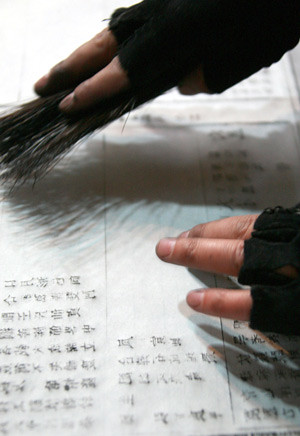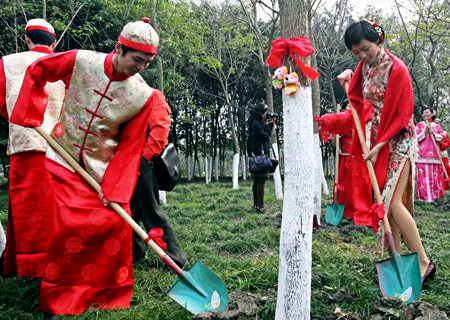| Home > Living in China > Kungfu |
Tai chi helps cut pain of knee arthritis
The traditional Chinese form of exercise known as tai chi can help reduce pain and physical impairment in people who have knee arthritis, researchers said on Saturday.
In their study, one group of people in their 60s with severe knee osteoarthritis performed tai chi for an hour twice a week for 12 weeks while a similar group did the same amount of conventional stretching exercises over the same period.
 |
|
Participants perform Tai Chi, a traditional form of Chinese martial arts, during an activity to celebrate the one-year countdown to the 2008 Beijing Olympic Games, in Beijing August 8, 2007. |
Those who did tai chi experienced greater pain reduction, less depression and improvements in physical function and overall health, researchers led by Dr. Chenchen Wang of Tufts Medical Center in Boston reported at a meeting of the American College of Rheumatology in San Francisco.
"Tai chi mind-body exercise appears to provide an important approach for self-care and self-management for knee (osteoarthritis)," Wang said in a statement.
The study provided the latest evidence that tai chi may offer benefits for people with arthritis. The Arthritis Foundation advocacy group recommends it for improving the quality of life of people with arthritis.
Tai chi is a form of exercise developed in China centuries ago. With tai chi, a person slowly performs a series of postures or movements that are low impact and put little stress on the muscles and joints. It can improve muscle function, balance and flexibility.
Osteoarthritis, the most common type of arthritis, develops when cartilage in the joints of the body wears down over time. It is incurable and worsens over time. Osteoarthritis in the knee can cause chronic pain when a person stands or walks.
Forty people took part in the study, and Wang said the findings should be confirmed in a larger study. Those who took part in the study had knee osteoarthritis for about a decade.
Art
 more
moreThe Dawn Breaks
(the prehistoric period - the 16th century BC) Ancient documents

2008 World Craft Council General
The 16th WCC General Assembly was held in China’s southern city of

Traditional wooden movable
Villagers print the book of the Chen's family tree

Customs
 more
moreChinese Kungfu
Everybody was kungfu fighting
Niels Tsai, a kungfu enthusiast from Malaysia, was halfway up misty
Tai chi helps cut pain of knee arthritis
The traditional Chinese form of exercise known as tai chi can help
Kungfu Taste: Learn Martial Art in Shaolin Temple
The mention of Shaolin Temple conjures up images of a quiet and




 print
print  email
email  Favorite
Favorite  Transtlate
Transtlate 
